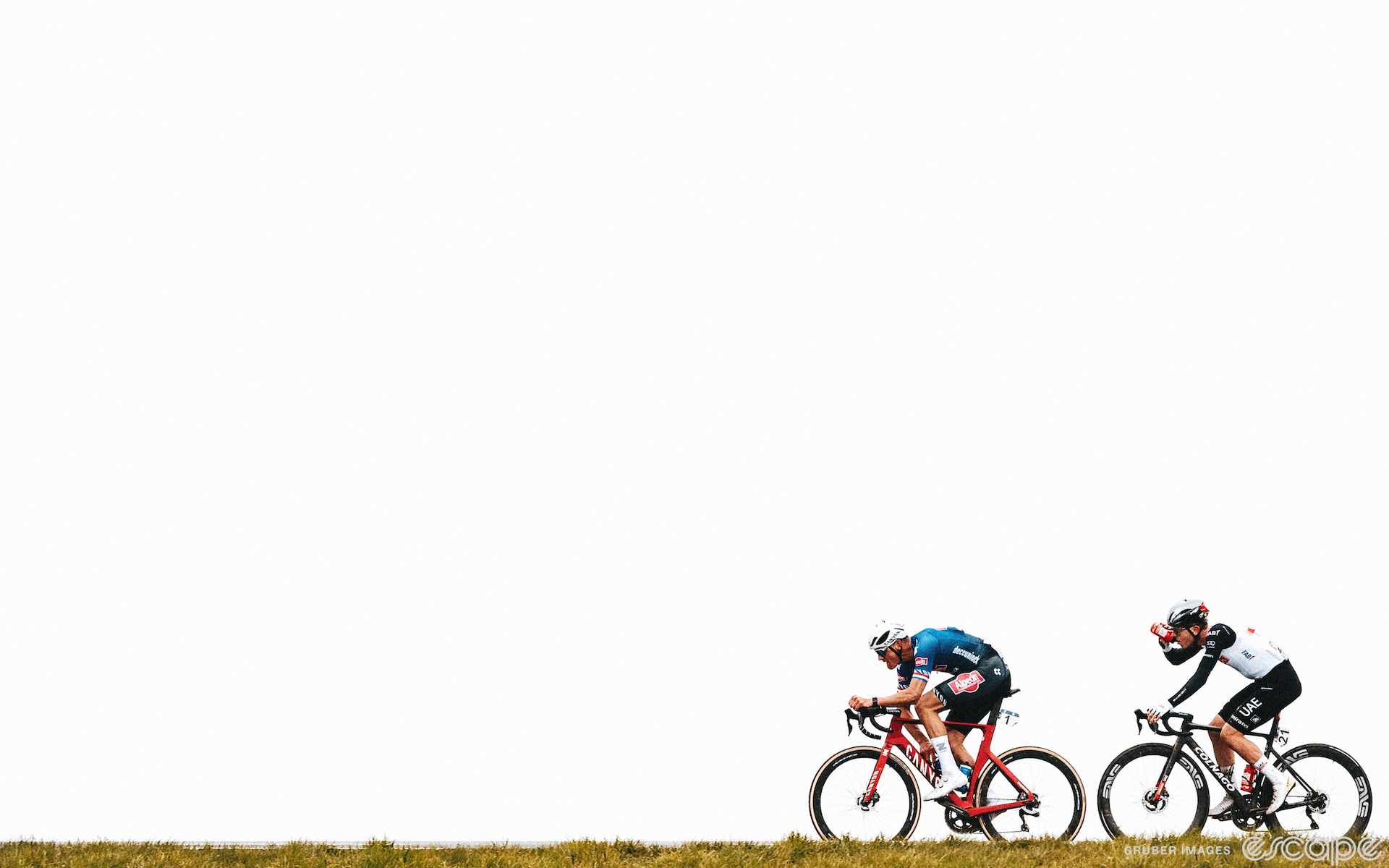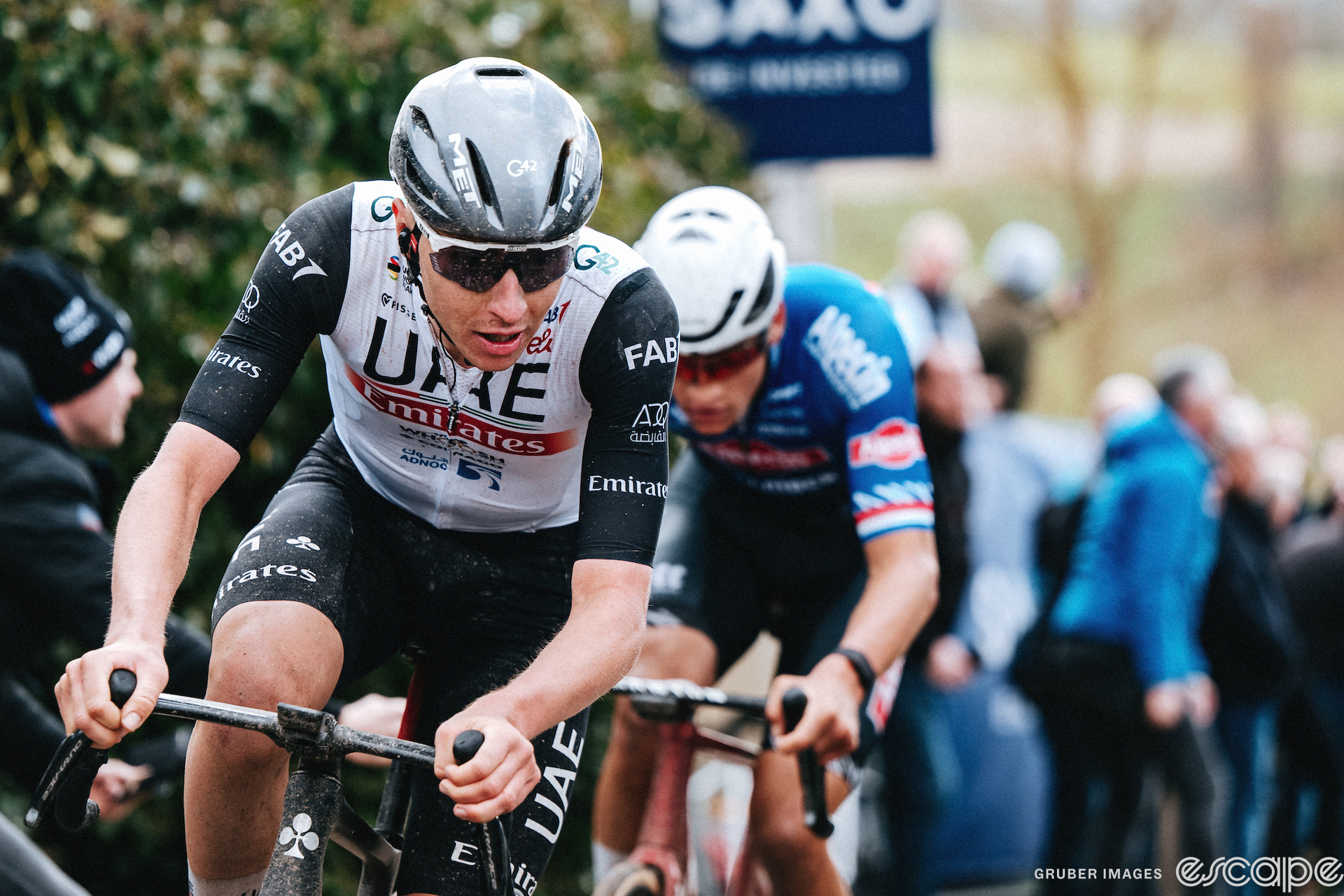Sunday’s men’s Liège-Bastogne-Liège is widely being hyped as a two-rider battle between Mathieu van der Poel and Tadej Pogačar. It may live up to that billing, although a lot depends on whether last Sunday’s relatively muted Amstel Gold Race performance from MvdP was him just taking a breather after the cobbles or signs of a peak in form.
But whether either rider wins or not, I’m more interested in what the day means for future matchups between the two, specifically in each rider’s potential quest to win all five Monuments.
Before I go any further: all this is predicated on the idea that becoming just the fourth rider in the sport’s history to win Milan-San Remo, the Tour of Flanders, Paris-Roubaix, Liège, and the Giro Lombardia – and the first since Roger De Vlaeminck completed the feat in 1978 – is something they want to do. That said, that’s not a stretch to think; Van der Poel will never be a Grand Tour contender, and so winning the biggest one-day races in the sport has to rank high on his bucket list. Meanwhile, Pogačar’s competitive goals are expansive enough that he’s said he wants to win every one-week stage race in the sport before he retires. It’s not hard to think that winning all five Monuments would be a tempting objective.
Andy McGrath made the case here last year for why Pogačar has the skills to do it, as well as why he might not. I wonder if it's Van der Poel who has the better path. That’s partly (more on that in a moment) because Van der Poel already has wins in the two races – Paris-Roubaix and Milan-San Remo – where luck plays an outsize role. As Wout van Aert learned last year, even the best Roubaix form can be undone by a flat tire at a bad moment.
But whoever might come out on top in a Pogačar vs. Van der Poel Monument duel, what I love the most is the idea of the matchup itself. That’s because it pushes each rider somewhat outside their comfort zones, and into the type of racing that is the other’s biggest strength. Van der Poel has won the rugged Paris-Roubaix and marathon Milan-San Remo; Pogačar, by turn, has proved his worth as a climber with multiple Lombardia wins and an LBL victory. The only overlap between the two’s Monument palmarès is the Tour of Flanders, which perhaps not coincidentally is racing’s intersection of cobbles and climbs, a kind of mid-point on a spectrum from Lombardia to Roubaix.
Given his performances in other cobbled races and on the “Roubaix” stage of the 2022 Tour, where he finished seventh, just ahead of two-time Roubaix podium finisher Jasper Philipsen, Pogačar would have to be accounted at least an outside favorite for Roubaix should he choose to focus on it.
But he’d likely have to change his training some to truly target the race, maybe adding a bit of muscle mass, which might mean sacrificing other goals for a given season. And of course none of that solves the riddle of a race like Milan-San Remo, where it seems like the best tactic for those other than field sprinters is: save as much energy as you can until the Poggio, have good position, lay one – and only one – devastating attack somewhere in the final kilometer of the climb, and hope you can hold a gap on the descent and that second-group syndrome stalemates the final few flat kilometers. Lotta “ifs” there; good luck.

That leads me back to why I think Van der Poel’s wins in M-SR and Roubaix are only partly responsible for his edge in this mythical, made-up Monument race. If Van der Poel is out of his element on the longer climbs of Liège and Lombardia, it’s only just. The man can do power climbs: witness the 2019 Amstel Gold Race or the 2021 Strade Bianche, each packed with shorter, steep ascents and a total of more than 3,000 meters of climbing. On those kinds of courses, Pog vs. MvdP is a fascinating matchup, as anyone who watched last year's World Championship road race can tell you.
Liège? Van der Poel was sixth in his lone prior outing here, in 2020. The same year he was 10th at Lombardia. But there’s a lot of daylight between those two results. At Liège, sixth place meant leading the first chase group across the line, 27 seconds behind an elite five-rider lead group (which contained Pogačar). In Lombardia, he was well off the pace (6:28 down) to winner Jakob Fuglsang. Also: it was 2020. The pandemic scrambled the calendar to where Lombardia was in August, before the Tour de France, and Liege was in early October.
But the larger point is that however Van der Poel goes Sunday, his biggest challenge is probably Lombardia, thanks to its longer climbs. The longest ascent at Liège is the 4.5 km Col du Rosier. The longest climbs in Lombardia depend a bit on the route – which flip-flops direction each year from Bergamo to Como and vice versa – but they’re more than double that distance, and are steep enough to favor lighter riders. If Pogačar may have to change his body and training for Roubaix, that seems even more clear for any Lombardia dreams for Van der Poel.
That said, it’s plausible, just as it’s plausible that Pogačar would be a threat for Roubaix. And that’s what makes this so fun: each rider, forced to compete on his rival’s favored terrain, and maybe in a situation where, to win and collect all five, he has to go straight through the other.
There’s been a lot of talk the last many months about cycling reform, which seems to pivot around dry and technical discussion of calendars and formats and stakeholders. We tend to forget that cycling, like all sports, connects to fans on the basis of personalities and stories. If it grows, it's because it's exciting, because people – including casual fans – get invested in the narrative and the riders who animate it.
After the Tour de France, the Monuments are some of the biggest races in the sport. Van der Poel and Pogačar are two of the sport’s superstars. If you win all five Monuments, you’ll be unquestionably accounted one of the greatest riders in the sport’s history. You don’t have to be a cycling superfan to understand and follow that. Sounds like a compelling story to me; would watch.
Did we do a good job with this story?



